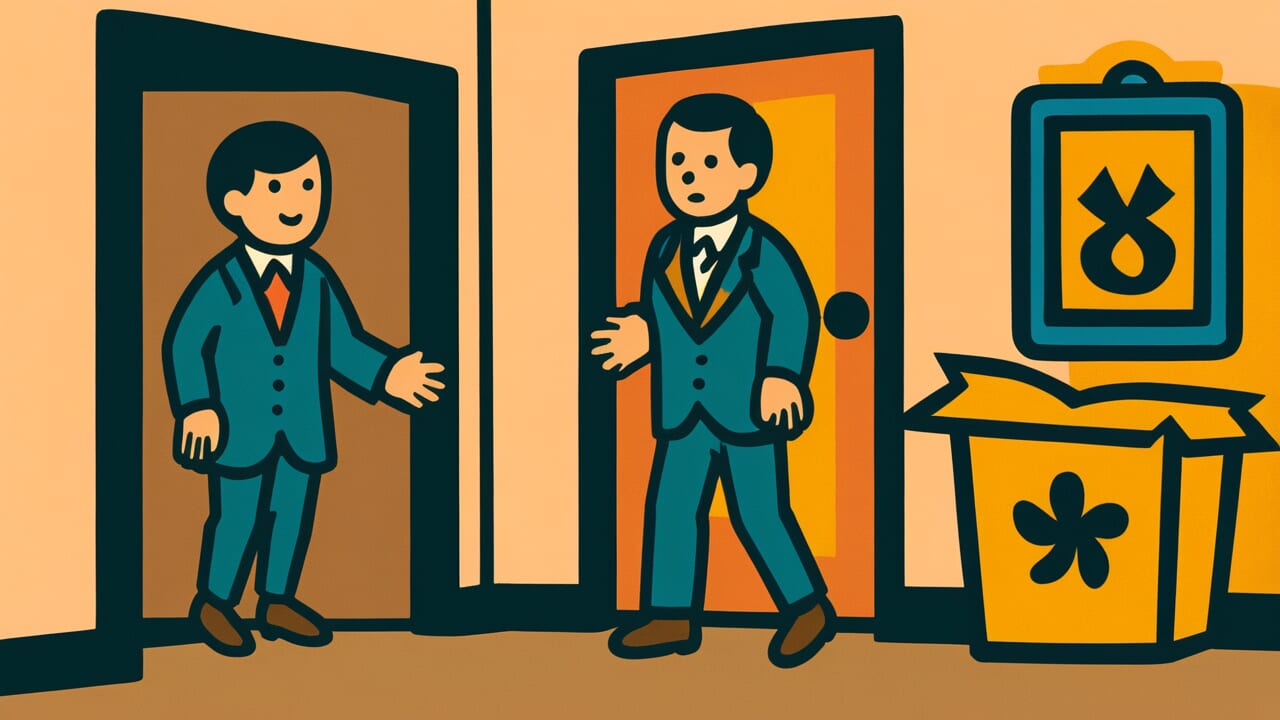How to Read “Misfortune and fortune have no gate; they are only what people invite”
Kafuku wa mon nashi tada hito no maneku tokoro nari
Meaning of “Misfortune and fortune have no gate; they are only what people invite”
This proverb means that neither disaster nor happiness comes randomly from some fixed place. Instead, they are both drawn to us by our own actions.
In other words, fate is not a matter of chance. It is shaped by the accumulation of our daily choices and behaviors.
The proverb shows a cause-and-effect relationship. If you continue doing good deeds, happiness will naturally come. If you pile up bad actions, you will invite disaster.
People use this saying when they want to emphasize the importance of taking responsibility for your own life. It’s also used to encourage someone who complains about bad luck to reflect on their own actions.
In modern times, it’s used to explain the importance of personal responsibility. It also helps motivate people to change their behavior positively.
Rather than blaming luck or circumstances, this proverb carries a hopeful message. Your future can change depending on your actions.
Origin and Etymology
This proverb is believed to come from the ancient Chinese text “Chunqiu Zuozhuan” (Spring and Autumn Annals with Zuo’s Commentary). The original phrase was “禍福無門、唯人所召.”
This was brought to Japan and became established as “Misfortune and fortune have no gate; they are only what people invite.”
The expression “have no gate” is quite striking. In ancient China, this showed the idea that happiness and disaster don’t enter through specific gates.
In other words, there’s no special entrance where happiness must arrive. Disaster doesn’t come through a predetermined route either.
The background of this saying reflects how people viewed fate at that time. In ancient societies, people commonly believed that gods or destiny determined disaster and happiness.
However, this proverb rejected such fatalism. It expressed a revolutionary idea that human actions determine outcomes.
The word “invite” is also important. It implies that happiness and disaster don’t come from outside. You yourself are calling them to you.
This philosophy is deeply connected to Confucian teachings. It reflects the idea of karma: accumulate virtue and happiness comes, pile up evil deeds and disaster falls upon you.
Usage Examples
- His success wasn’t luck. “Misfortune and fortune have no gate; they are only what people invite”—it was the result of steady effort.
- I’ve had constant troubles lately, but “Misfortune and fortune have no gate; they are only what people invite,” so I should reflect on my own actions.
Universal Wisdom
This proverb has been passed down for thousands of years. The reason is that humans have always faced the question: “Why is this happening to me?”
When misfortune strikes, people want to think “I had bad luck” or “It’s someone else’s fault.” When blessed with good fortune, they tend to see it as a coincidence.
However, this proverb touches on a fundamental human truth. Our lives are actually built from countless small choices.
What mood do you wake up with in the morning? How do you treat people? How do you face difficulties? These daily choices eventually appear as major results.
Humans have a tendency to lose sight of the cause-and-effect relationship between actions and results. When good deeds don’t show immediate results, we feel they’re meaningless.
When the price of bad habits comes late, we lament why such things happen to us. This proverb understands this human weakness.
Yet it teaches the truth that in the long run, cause and effect always come full circle.
This isn’t just a moral teaching. It expresses the very mechanism of life itself. That’s why this saying continues to resonate with people across time and culture.
When AI Hears This
The structure where fortune and misfortune seem random but are actually self-invited can be explained remarkably clearly through the concept of “attractors” in complexity science.
An attractor is the property where a system is drawn to a specific state, like a pendulum eventually coming to rest.
What’s noteworthy is the “magnetic field of attraction” created by human behavior patterns. For example, an angry person gets pulled back to anger even by trivial events.
This is exactly the phenomenon where the system converges to the same attractor even with slightly different initial conditions. Whether the morning coffee is lukewarm or the train is late, they ultimately settle into the “irritated” state.
Conversely, an optimistic person experiences the same events but gets drawn to a different attractor: “Oh well, no big deal.”
What’s fascinating is the “deterministic but unpredictable” nature shown by chaos theory. You cannot predict what events will happen tomorrow.
However, in the long term, the “attractor” of that person’s thought patterns repeatedly draws specific results. In other words, individual fortunes and misfortunes seem to arrive without gates.
But statistically, you are definitely inviting them. This duality is precisely the mathematical structure of life that ancient Chinese sages intuitively grasped.
Lessons for Today
What this proverb teaches us living in modern times is hope. The control of your life is always in your own hands.
You might envy others’ seemingly happy lives on social media. You might lament your misfortune. But what truly matters is what choice you make at this very moment today.
Small acts of kindness, sincere responses, positive words—these daily accumulations will eventually shape your life. Conversely, little lies, lazy attitudes, and negative thinking also pile up in the same way.
Just because you can’t see results doesn’t mean your actions are meaningless. If you don’t plant seeds, flowers won’t bloom.
Modern society tends to seek immediate results. But essential happiness in life is something you cultivate over time.
Today’s actions create tomorrow’s you, next year’s you, and your entire life. Whatever situation you’re in, you have the power to make better choices.
Believe in that power and move forward one step at a time.



Comments